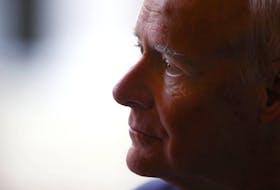Niagara Region entrepreneur Paul Moyer likes to cite a California business professor to help explain the challenges he faced when he and a partner developed a new method for cleaning apples and other produce in 2015.
“The electric light did not come from the continuous improvement of candles,” goes the quote, attributed to the late Oren Harari.
“The hard part is you’ve got to get people with real dollars to understand we’re going to invest in the electric light bulb and it’s going to be way better than candles,” Moyer, 55, said by phone recently from Beamsville, Ont. “And somebody’s like, ‘We’ve been using candles for 3,000 years and they’re awesome. Why are we going to turn this … upside down?’ That’s the dilemma we’re running into .”
For Moyer, that meant convincing others to believe in a process that relied on ultraviolet light, hydrogen peroxide and ozone instead of water-based solutions.
Despite skepticism in some quarters, the harvest-table-sized machine he developed with University of Guelph food scientist Keith Warriner to zap, mist and gas apples after a 2015 listeria outbreak in California threatened his candy-apple business was eventually adopted by Sunkist.
Now it has taken on new life during the pandemic after it was found to kill germs and viruses on personal protective gear for health-care workers just as well.
Their company, Clean Works Corp., has government and hospital contracts across Canada as it seeks to tap into a global antiseptic and disinfectant market forecast to hit US$30 billion a year by 2026, according to Grand View Research of San Francisco.
Moyer leads a cast of Canadian entrepreneurs retargeting their businesses to tackle the pandemic, turning from economic malaise to opportunity as health-care spending balloons. The question for many will be how to sustain growth after the disease subsides.
Clean Works, with the only Canadian-developed technology to sanitize N95 masks, is betting on widespread applications after the pandemic, such as cleaning 18-wheeler trailers that these days might haul beef from Alberta to Ontario before returning unwashed with a load of produce, Moyer says.
“We have the opportunity to sanitize stuff that people aren’t even thinking about. Imagine you fly from Hong Kong to London then New York and on to wherever. That luggage has been handled numerous times and on dirty surfaces and the first thing you do is you go upstairs and put it on your bed and open it up.”
Waterloo, Ont., native Jeremy Hedges, 27, is another entrepreneur who has found success in the fight against COVID-19. He turned his educational 3-D printer and laser-cutting technology company, InkSmith, into The Canadian Shield, which has produced more than 16 million transparent face shields since late March, when a local doctor told him area hospitals were short on PPE.
“At the time we didn’t really see this as a business opportunity. We thought we were going to make 10,000 shields, donate it and call it a day. But we made a post on Twitter and it went pretty viral,” Hedges said by phone. “We sold 11 million shields in 30 days.”
Revenue soared into the tens of millions of dollars compared with less than $2 million last year, while the company’s employee count jumped to 300 in July from seven, to fulfill a 10-million-unit federal contract, Hedges said.
Safely scaling an operation during a pandemic was a challenge, he said, as the company went from never having made a shield to producing 150,000 quality-checked versions a day within a month.
“It was a pretty crazy day-to-day iterative process,” Hedges said. “Our production line would change twice a day because we would try to make it incrementally more efficient. And it worked.”
The global face-shield market is expected to grow from US$2 billion to US$5.4 billion in 2027, according to Grand View Research. It forecasts the global disposable-mask market will soar from an estimated US$800 million in 2019 to $166 billion this year.
While the market growth provides one opportunity, Hedges is pivoting again, scaling back on face shields and moving into disposable surgical masks while increasing automation and access to local compostable material, moves he hopes will help him compete internationally with countries such as China when pandemic demand eases. Canadian government pledges to support the domestic industry through contracts will help sustain demand, while Hedges says his long-term goal is to export not only the finished products but also the materials and means of production.
Another fast growing company is Hamilton-based Jayson-MyersHealth Inc., which has rocketed from its start in September 2019 to supplying masks, infrared thermometers, gowns, disinfectant and other medical supplies across Canada. Founders Benard Miregwa and Florence Mwango plan to expand their production for items such as wipes.
“The market is huge,” Miregwa said by phone, noting that Lysol and Clorox wipes likely won’t return to Canada in significant numbers until May. “The post-COVID world is going to be about cleaning, cleaning, cleaning, so in having those kind of products we should be able to grow quickly.”
Two St. John’s companies are also adjusting their focuses to combat the pandemic. Christine Goudie, co-founder and CEO of Granville Biomedical, has developed a nasal swab that is entering clinical trials after previously concentrating on anatomical models. Mike Loder’s Biolantic Service Inc., meanwhile, expanded its internet reach to train technicians working on ventilators, diagnostic imagers like MRIs and other equipment.
Goudie’s startup was just a year old when the pandemic was declared in February. Now her swab is about to be tested in Brazil and Peru next month, where a pass would put Granville among 10 companies in the running for an order from Ottawa of 28 million swabs by March, she said.
The market in the U.S. and Brazil could be worth $700 million by March, she said. This year’s global market for COVID-19 detection kits, where swabs account for about 45 per cent of the cost, is valued at US$3.28 billion, again according to Grand View Research.
Goudie says that even if the trial doesn’t work out, the data they’ve collected is invaluable and could help them with other products, such as a pelvic exam swab that is under development.
“We’re kind of excited with how that’s going to play out in the future,” Goudie said.
Financial Post
Copyright Postmedia Network Inc., 2020







